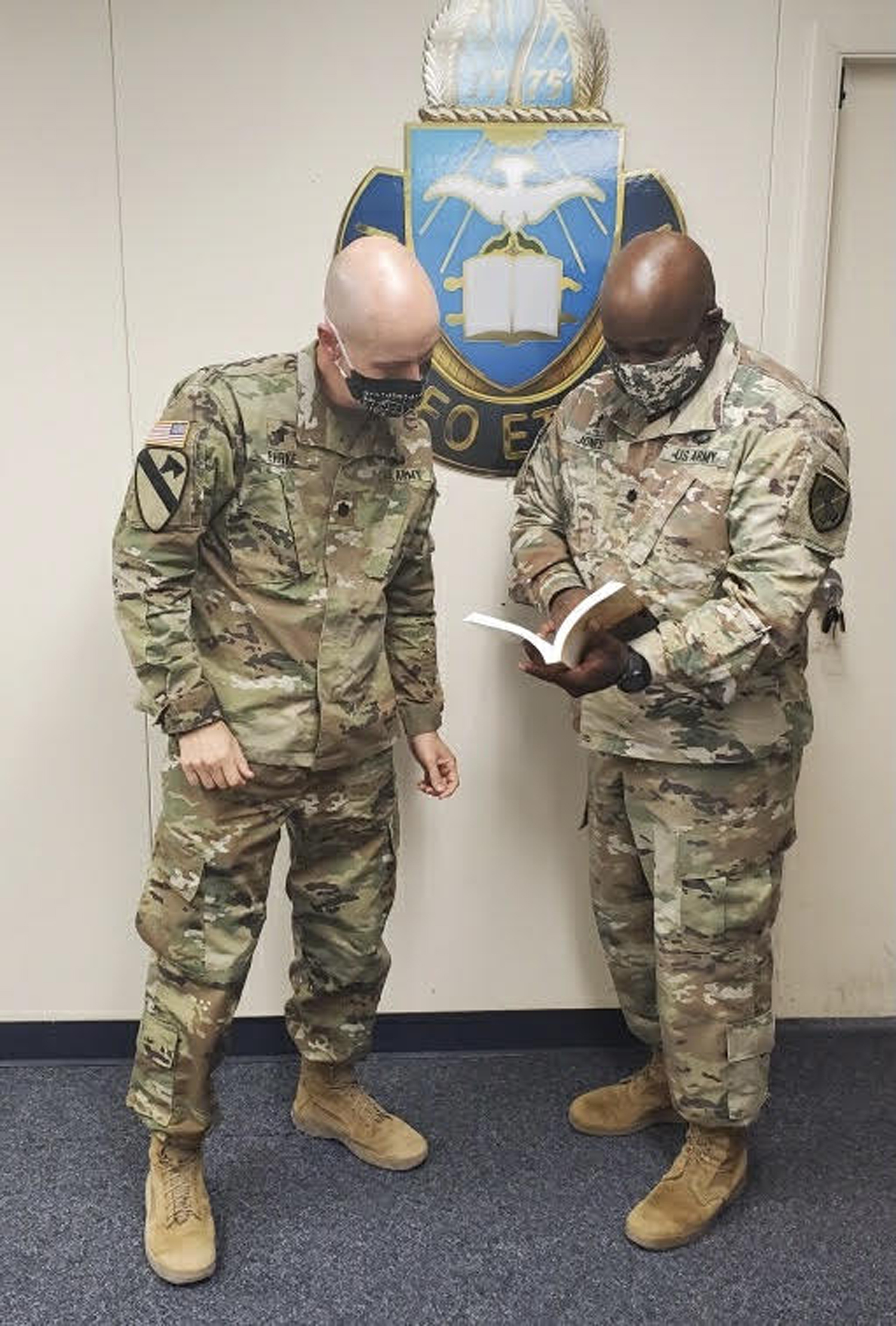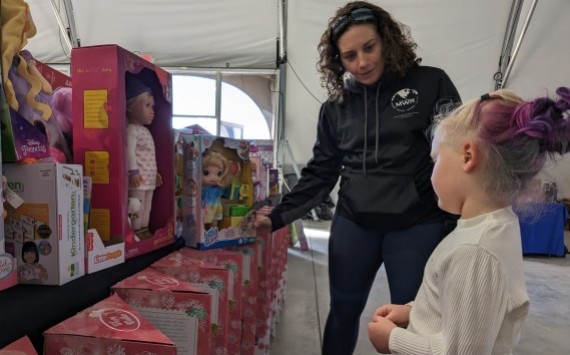FORT IRWIN, Calif. — When a divorced couple with children remarries to new partners, the process of reacclimating kids to their new stepfamilies, can be difficult. But Bonnie Conrad’s family has blended smoothly.
“Co-parenting is never easy, and it is something that a lot of blended families have a hard time coping with,” she said. “My story, however, is not a negative story. My ex-husband’s wife and I are very close friends. We talk all the time on the phone.”
Blended family and co-parenting success stories like Conrad’s are possible, although sometimes it takes years of discussion, compromise and counseling.
The Religious Services Office at Fort Irwin has trained Family Life Chaplains who are available to help families navigate these familial roads.
“The therapy models remain the same,” Chaplain (Lt. Col.) Donald Ehrke said. “There is no, ‘blended family therapy’ or ‘not blended family therapy.’”
The models Ehrke refers to relate to Cognitive Behavioral Therapy, Emotion Focused Therapy, Narrative Therapy, etc., which he said applies to all people.
“I would approach a blended family by learning about the relationships between all of the family members and how they interact with one another,” he said. “I would do the same with any family, actually, although a blended family may (or may not) bring different items to the table.”
Family Life Chaplains receive training at one of three universities. Ehrke got a Masters of Science in Psychology and Counseling from Texas A&M University, Central Texas.
He recently arrived at the National Training Center and Fort Irwin and brought those skills to chaplain team.
“Although not every chaplain can receive an MS in Psychology and Counseling, I can share some useful insights to help chaplains improve their counseling skills,” Ehrke said.
According to reports released by the Pentagon, married troops are divorcing at about the same rate as they have for the previous five years, which is 3%.
The overall divorce rate is higher for enlisted troops (3.5%), compared to the divorce rate for officers (1.7%).
Recent data from the United States Census Bureau shows more than four million children in U.S. live with a stepparent, and approximately 15% of all households are categorized as ‘blended families.’ Although there is no data showing the number for a blended military family, Military One Source data shows more than 40% of remarried servicemembers have children from a previous marriage and more than two million children are classified as military dependents.
With no standard laws addressing the challenges of military life, like constant relocations, military families often struggle more with child custody and the road to blending families than their civilian peers.
Chaplain (Lt. Col.) Terrell Jones has been a trained, Military Family Life Chaplain for more than 20 years, counseling dozens of families. His advice to families is for parents to remain mature and professional, staying focused on what is most important—the youth involved—by setting a good example.
“It’s not about you or us, it’s always about the kids,” Jones said. “Co-parenting can be kind of rough. You have to set some boundaries.”
He said one of the reasons couples divorce is because they may have different life perspectives, which could be an initial hinderance in co-parenting.
“We’ve got to set some ground rules,” Jones said. “We may have to deal with some unresolved issues, maybe we have to agree to disagree and be able to move on, but it always starts with agreeing with what’s best for the kid.”
Youth go through stages of development and Jones said parents need to be on the same page and in agreement for the home environment, including homework management, screen time, etc.
“It should look like the only thing different is the ‘environment’ but we’re on the same sheet of music on core things,” he said.
In order for blended family counseling to be successful, Jones said adults must drive the sessions and compromise. He conducts counseling sessions with the ex-spouse, using telephone conferences or video conferences when necessary because with military families, many are not in the same state.
“In situations when only one adult wants to participate, I try to empower that one adult with information on what to say when they discuss it with the other parent,” Jones said.
Jones reiterated the importance of having boundaries within blended families, beginning with how to identify the stepparent.
“One of the simplest boundaries is, what do I call this person? Stepdaddy or by their first name or Mr. or Mrs.?” he said, which can be cultural.
Jones also pointed to the reality of blended families in the 21st century.
“In 2020, what does ‘blended family’ mean?” Jones said. “You can talk about adoption, same-sex marriage bringing a child in that family—there’s a lot of variables that, as counselors, we have to factor in.”
Jones tells his chaplain team to leave their personal thoughts out of their counseling to parents.
“I tell my chaplains all the time, who cares what you think about it,” he said. “I’m not coming to get your thoughts, I’m coming to get your help.”
Jones uses caution when counseling from the biblical perspective because he said the Bible is interpreted differently from so many people.
“When I do counseling, I ask people, do they want secular counseling or spiritual counseling,” Jones said.
There are studies that say blended families should plan to take five to seven years to form a solid relationship, and even longer for military families, although Jones said there’s no average timeline for families to acclimate to one another.
“There are so many variables—the age of the kids…for military, moving a family and kids from one environment to another, like overseas…getting used to another person of authority in the home,” he said. “So to put that on a timeline, it can be difficult. In my experience, the more aggressively the family wants the help, the more it lessens the time.”
During the COVID-19 environment, Jones said chaplains have seen a rise in divorce, marriage conflict and blended family counseling, but he doesn’t have a negative perspective on this.
“The numbers have been up and our counseling load has been up but to me that’s a good thing because if my counseling load is going up, it may hinder the domestic violence before things get out of hand,” he said.
Jones said it’s a positive sign because people realize they need to speak to someone sooner.
“I’d rather my counselor loads go up because that may stop the domestic violence numbers from going up,” he said. “That means that someone is saying we need to talk to somebody. They’d rather speak to someone than get to a point where they’d get in trouble.”
Chaplains are often asked about matters of child support or divorce decrees but they refer parents to JAG (military attorneys) and Jones said he actually advises chaplains not to give advice overall.
“I don’t believe in giving advice, because anyone can give advice, I give options,” Jones said.
He believes that as a counselor, when you give people advice, the chaplain takes ownership of their problem, so he tries to train chaplains to know their role is to, instead, provide options that fit the direction they want to go.
Conrad said co-parenting did not start off easy for her but has some advice to get blended families off to a good start.
“If I could give one piece of advice to blended families in the military, I would say, be the adult you want your kids to grow up to be,” she said. “Family is family, whether it’s the one you start out with, the one that you end up with, or the family you gain along the way.”












